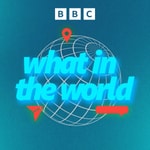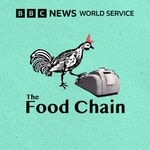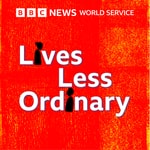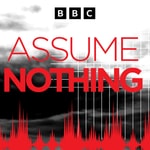What in the World – Détails, épisodes et analyse
Détails du podcast
Informations techniques et générales issues du flux RSS du podcast.

What in the World
BBC World Service
Fréquence : 1 épisode/1j. Total Éps: 454

Helping you make sense of what’s happening in your world. Big stories, small stories and everything in between. Understand more, feel better. Five days a week, Monday to Friday.
Classements récents
Dernières positions dans les classements Apple Podcasts et Spotify.
Apple Podcasts
🇫🇷 France - news
21/04/2025#96🇫🇷 France - news
18/04/2025#91🇫🇷 France - news
17/04/2025#80🇩🇪 Allemagne - news
16/04/2025#85🇫🇷 France - news
16/04/2025#92🇬🇧 Grande Bretagne - news
15/04/2025#99🇩🇪 Allemagne - news
15/04/2025#82🇫🇷 France - news
15/04/2025#86🇩🇪 Allemagne - news
14/04/2025#88🇩🇪 Allemagne - news
13/04/2025#96
Spotify
Aucun classement récent disponible
Liens partagés entre épisodes et podcasts
Liens présents dans les descriptions d'épisodes et autres podcasts les utilisant également.
See all- https://www.bbc.co.uk/actionline/
17 partages
- https://www.129.go.kr/1393/
1 partage
Qualité et score du flux RSS
Évaluation technique de la qualité et de la structure du flux RSS.
See allScore global : 43%
Historique des publications
Répartition mensuelle des publications d'épisodes au fil des années.
Why do scientists want to bring back extinct animals?
vendredi 11 avril 2025 • Durée 12:14
The US company Colossal claim to have brought back the dire wolf from extinction after 12,000 years through genetic engineering. The three pups, called Romulus, Remus and Khaleesi, are now living in an undisclosed nature preserve, unaware that their existence has made headlines around the world. But Colossal aren’t finished yet, they want to continue to “de-extinct” other animals, such as the woolly mammoth.
BBC Science Correspondent Victoria Gill explains how the experiment was done. How realistic is “de-extinction”? And are these actually dire wolves?
Instagram: @bbcwhatintheworld Email: [email protected] WhatsApp: +44 0330 12 33 22 6 Presenter: William Lee Adams Producers: Josh Jenkins and Emilia Jansson Editor: Emily Horler
South Sudan conflict: Explained
jeudi 10 avril 2025 • Durée 09:41
Tensions in South Sudan are rising, threatening an already fragile peace deal between President Salva Kiir and his rival First Vice-President Riek Machar.
They signed the peace agreement in 2018 to end a five-year civil war that killed nearly 400,000 people. But now, many are worried that South Sudan could be on the brink of another civil war.
Ashley Lime, a BBC reporter in Nairobi, explains why this latest violence has escalated and outlines the relationship between these two leaders.
Instagram: @bbcwhatintheworld Email: [email protected] WhatsApp: +44 0330 12 33 22 6 Presenter: Hannah Gelbart Producers: Emily Horler and Benita Barden Editor: Verity Wilde
Why does Trump want Greenland to be part of the United States?
vendredi 28 mars 2025 • Durée 09:58
US Vice-President JD Vance and his wife Usha are scheduled to land in Greenland on Friday afternoon. Their visit comes as President Donald Trump continues his threats to take over the world’s largest island, which is a semi-autonomous territory of Denmark. But the planned visit has been scaled back following protests. Rather than visiting a dog sled race and cultural sites, the Vances will instead tour an American space facility. BBC journalist Laura Gozzi explains the basics of what the United States would gain if Greenland became part of the U.S. And we also hear reaction from two 26-year-old Greenlanders, as we try to understand how local people feel about the latest developments.
Instagram: @bbcwhatintheworld Email: [email protected] WhatsApp: +44 0330 12 33 22 6 Presenter: Hannah Gelbart Producers: Mora Morrison and Elena Angelides Editor: Verity Wilde
COP29 was all about the money
lundi 25 novembre 2024 • Durée 16:27
The annual United Nations climate change conference ended on Sunday but not everybody was happy. This year, the main focus was on getting richer countries, who have contributed more to climate change, to pay poorer, developing countries so that they can better deal with the impacts of climate change.
COP29 was held in Baku, Azerbaijan, and the talks were meant to end on Friday. The negotiations ran over into the weekend and a deal for $300 billion was finally agreed on Sunday at 3am.
However, the African Group of Negotiators described the final pledge as "too little, too late" and India said that “the amount that is proposed to be mobilised is abysmally poor. It's a paltry sum.”
BBC climate reporter Georgina Rannard was in Baku and takes us through the final deal. Georgina also speaks with two climate activists who were campaigning at COP29.
Plus, Jordan Dunbar from the BBC’s Climate Question podcast gives us three success stories of how climate change is being tackled around the world.
Instagram: @bbcwhatintheworld WhatsApp: +44 0330 12 33 22 6 Email: [email protected] Presenter: Hannah Gelbart Producers: Emily Horler and Adam Chowdhury Editor: Rosanna La-Falce
Flex culture: Is shopping addiction driving Malaysia’s youth debt crisis?
vendredi 22 novembre 2024 • Durée 14:21
According to a major government survey, more than 70% of young people in Malaysia are in debt. Officials say shopping addiction is the number one reason why.
Social media feeds that addiction by promoting “flex culture” — the desire to flash your wealth in person and online. Leeloo Larcombe, a fashion and lifestyle influencer, tells us about Malaysia’s shopping culture and her complicated relationship with it. Bryan Chen, the co-founder of Malaysia's biggest streetwear convention, Sneaker-LAH, explains how his shoe addiction has at times left him in debt.
The rise of buy now, pay later (BNPL) schemes also encourages people to live beyond their means. Doris Lieu, an economist at the IDEAS Malaysia think tank, explains how these schemes grew in popularity during the pandemic and why young people are attracted to them.
Finally, Pete Yong, the financial literacy expert behind the popular Mr Money TV YouTube channel, offers some practical tips to help people pull themselves out of debt.
Instagram: @bbcwhatintheworld WhatsApp: +44 0330 12 33 22 6 Email: [email protected] Presenter: Hannah Gelbart Producers: William Lee Adams and Benita Barden Editor: Julia Ross-Roy
How Thailand’s same-sex marriage law could impact South East Asia
jeudi 21 novembre 2024 • Durée 12:28
Thailand has become the first country in South East Asia to legalise same-sex marriage. The new law means that LGBTQ+ couples will have the same legal rights as other couples when it comes to adoption, inheritance and medical decisions. It’s taken activists years of campaigning to get to this point, and in September 2024 Thailand's king signed it into law. It will come into force in January 2025.
BBC Thai journalist Panisa Aemocha, in Bangkok, explains the same-sex marriage legalisation in Thailand and attitudes towards LGBTQ+ in the country. This includes how Thailand has embraced boy love (BL) and girl love (GL) TV series - which show same-sex couples.
We also hear from Best Chitsanupong Nithiwana, an activist who co-founded the Young Pride Club in Chiang Mai, who tells us what this new law means for same-sex couples in Thailand. And we ask, could other nearby countries do the same?
Instagram: @bbcwhatintheworld WhatsApp: +44 0330 12 33 22 6 Email: [email protected] Presenter: Hannah Gelbart Producers: Mora Morrison, Benita Barden and Julia Ross-Roy Video producer: Baldeep Chahal Editor: Verity Wilde
Why does Iran call women protesting the hijab ‘mentally ill’?
mercredi 20 novembre 2024 • Durée 14:09
A video of an Iranian student in her underwear at a university campus in Tehran has gone global. It shows Ahoo Daryaei walking around grey concrete buildings in a purple bra and knickers before being forcibly detained. Authorities were quick to claim that she was suffering from poor mental health, but many have seen it as an act of defiance against the hijab.
Faranak Amidi, a BBC journalist and presenter, tells us what life is like for women in Iran right now, and how they are bravely fighting for more rights. Azam Jangravi, an Iranian activist who now lives in Canada, shares her experience of being being arrested following her protest in 2018.
Instagram: @bbcwhatintheworld WhatsApp: +44 0330 12 33 22 6 Email: [email protected] Presenter: Hannah Gelbart Producers: Mora Morrison and William Lee Adams Editor: Verity Wilde
Māori rights protests in New Zealand
mardi 19 novembre 2024 • Durée 12:40
You might have seen the viral video of 22-year-old MP Hana-Rawhiti Maipi-Clarke doing the haka in the middle of New Zealand’s parliament last Thursday. It was a protest aimed at disrupting the debate in parliament about a bill which, if it became law (which is unlikely), would transform the way the indigenous Māori population are treated by changing the nation’s 184-year-old treaty.
Then, on Tuesday, a nine-day march to New Zealand’s parliament building in the capital city Wellington came to an end, with over 40,000 people from different backgrounds voicing their opposition to the proposed new bill. BBC reporter Katy Watson was at the protests and describes what it was like.
So what is life like for Māori people? The BBC’s Kathryn Armstrong takes us through the background and history of New Zealand’s Treaty of Waitangi. Plus, the BBC’s Vandhna Bhan breaks down the details of the proposed new bill.
Instagram: @bbcwhatintheworld Email: [email protected] WhatsApp: +44 0330 12 33 22 6
Presenter: Hannah Gelbart Producers: Emily Horler, Mora Morrison, Hayley Clarke and Adam Chowdhury Editor: Rosanna La-Falce
Elon Musk: From tech billionaire to Donald Trump adviser
lundi 18 novembre 2024 • Durée 13:23
Elon Musk — the world’s richest man — has built several companies, including PayPal, Tesla, and SpaceX. He’s also built a close relationship with Donald Trump, president-elect of the United States. America’s next leader has appointed Musk to run the newly created Department of Government Efficiency, which is meant to slash government waste.
Nathalie Jimenez, a BBC reporter in New York, explains how Musk built his business empire and why he may have aligned with the Trump administration. She also discusses Musk’s personality traits and how they influence how he leads.
And Lily Jamali, the BBC’s North America Technology Correspondent, explains the ways Musk does and does not reflect “tech bro” stereotypes.
Instagram: @bbcwhatintheworld Email: [email protected] WhatsApp: +44 0330 12 33 22 6 Presenter: Hannah Gelbart Producers: William Lee Adams, Benita Barden and Julia Ross-Roy Editor: Verity Wilde
Is Korea’s Suneung the world’s most stressful exam?
vendredi 15 novembre 2024 • Durée 15:51
Can you imagine sitting all of the most important exams of your life on one day? That’s the reality for Korean students, whose university-entrance exam, the Suneung, sees students sit an eight-hour marathon of exams, all on one day. Juna Moon, our reporter in Seoul, tells us why a record number of students are resitting the brutal exam this year. Plus Koh Ewe, a BBC journalist in Singapore, tells us which K-pop earworm students are trying to avoid to stop it from distracting them.
Julie Yoonnyung Lee, a BBC reporter from Seoul now in London, joins us in the studio, to give us her own experience of the exam, and the years of late nights and ‘cram schools’ preparing for it. We also discuss the mental health challenges that can come with such high academic pressure.
Plus we hear from our China media analyst Kerry Allen, who explains the Gaokao, China’s university entrance exam, which might be even harder.
Instagram: @bbcwhatintheworld WhatsApp: +44 0330 12 33 22 6 Email: [email protected] Presenter: Hannah Gelbart Producers: Emily Horler and Hayley Clarke Editor: Verity Wilde








